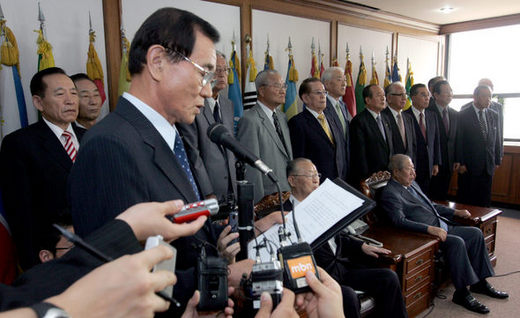 |
|
Former defense ministers and retired generals on August 10 voice their opposition to the government's plan to take over wartime operational command over it's millitary from the U.S. on August 10.
|
Former defense ministers now critics of S.K. military control plan
While several former national defense ministers are speaking against the current administration’s moves to gain wartime military control from the U.S., Ministry of Defense white papers published during their terms call for the control handover. One defense ’white paper’ published in 1988 when minister O Ja-bok was in office directly expresses a wish for Korea’s independent exercise of wartime operational control. According to the paper, "Despite advantages and efficiency in security, the current system under which ROK-U.S. Combined Forces Command holds wartime operational control conflicts with the sentiment of the population, who want to see our commanders exercise wartime command." The paper continues, "Moreover, according to the demand for national pride in this age, we should review and coordinate the problems surrounding the ROK-U.S. joint operational control and the relocation of United States Forces Korea (USFK) bases in Seoul." Another white paper, published between 1992 and 1993 during Choi Se-chang’s term, stresses that "the future Korea-U.S. security cooperation will develop the current U.S.-led combined defense system" into a joint one with Korea at the helm. "Additionally, a mutually beneficial military partnership will be established between the two allies," the paper says. The white paper mentions a concrete timetable, saying, "If defense of the nation is completely ’Koreanized’ during the second half of the 1990s, the U.S.-led joint defense system will be changed into a strategic system of Korea-led coexistence."The strategic coexistence mentioned in the paper represents the concept of a joint defense system, which is similar to the U.S.-Japan alliance model and will be included in South Korea’s roadmap for independent exercise of wartime command to be presented at the 38th Korea-U.S. Security Consultative Meeting (SCM) due to be held in Washington in October. The "1994-1995 Defense White Paper," issued by then-minister Lee Byeong-tae, reads, "Until now, ROK-U.S. security cooperation was made within an unbalanced relationship, in which Korea depended on the U.S. for its defense. From now on, it will be changed into a Korea-led structure of strategic coexistence under a plan to ’Koreanize’ the nation’s defense." The defense white paper for the next two years issued during Lee Yang-ho’s term agrees with this assertion. However, the "1997-1998 Defense White Paper" published by the defense ministry under Kim Dong-jin, shows a somewhat different position, saying that "when the North Korean threat disappears, the Korean Army should lead national defense."






